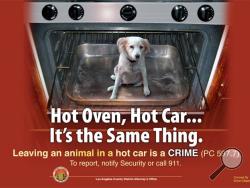Spotting a pet in a hot car creates tough choices
Posted: September 4, 2014 - 4:03am
LOS ANGELES (AP) -- Imagine walking to your car after running errands and spotting a dog, panting and helpless, shut inside a hot car. Smashing the window might be your first impulse, but calling police or animal control will protect you from injury and possible lawsuits, experts say.
Hundreds of pets die each year when they are left in closed cars that rapidly become deadly on hot days, estimated Dr. Jules Benson, chief veterinary officer for Petplan pet insurance. He cited insurance claims, veterinarian records and other data.
"This just doesn't need to happen," Benson said. "Nobody means for it to happen. It is preventable."
Every minute counts when an animal is inside a hot car, but authorities encourage people to call 911 instead of breaking in. Those who do cause damage rescuing animals wouldn't be charged unless there is evidence of criminal intent, but dog owners could choose to sue, prosecutors said.
"California state law allows police and humane and animal-control officers to do what is reasonably necessary to remove an animal from a vehicle if it is in immediate danger," Los Angeles County Deputy District Attorney Deborah Knaan said. "The law does not mention civilians."
Attempting a rescue yourself can also lead to injury, said Bill Johnson, executive director of the National Association of Police Organizations.
"You may be trying to help the dog, but the dog doesn't know who you are. And you don't want to get yourself hurt," he said.
States' anti-cruelty laws are used to prosecute people who endanger their animals. The Animal Legal Defense Fund said 15 states have laws that go further by prohibiting leaving pets in hot cars and giving first responders an extra layer of protection against possible lawsuits.
It takes just 10 minutes for the inside of a car to reach 102 degrees when it's 85 degrees out, even with the windows cracked, the American Society for the Prevention of Cruelty to Animals said. In half an hour, the temperature will soar to 120 degrees, which can be lethal in minutes. Because dogs can't sweat, they can't control their body temperature in intense heat, leading to extensive organ damage, heatstroke or suffocation.
To stem the deaths, the Philadelphia Police Department created a campaign about the dangers of forgetting pets and kids in hot cars, an effort other municipalities have undertaken.
The agency put a drawing of a broken window on its Facebook page, with the message: "You're never too busy to remember -- and if you forget -- the PPD will gladly open the window for you!"
Philadelphia police urge people to call 911 so officers can rescue pets, "but we also realize that every second counts and people have to do what is right," said Sgt. Eric Gripp, who made the online post.
Nancy Hassel has been trying to deter hot-car deaths for years. As president of the networking group Long Island Pet Professionals, she tells students taking her classes on responsible dog ownership: "If you see something, do something."
Animal welfare agencies largely work to inform the public because there's a lack of awareness about the danger of a hot car.
"People often don't realize how hot the inside of their cars can get and how fast that happens," said Stacy Wolf, the ASPCA's senior vice president of anti-cruelty.

